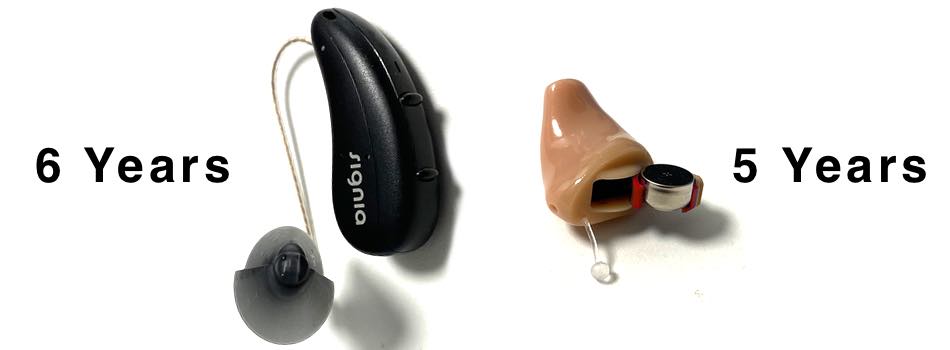Here in this article, you will learn how long hearing aids last on average and what exactly influences the lifespan of hearing aids.
In-the-ear hearing aids last up to five years on average, while behind-the-ear hearing aids typically last six years.
The life span is heavily influenced by the user. There are some factors that can not be controlled and others that can be controlled. For example, some wearers of hearing aids have a lot of moisture in the ear canal which oftentimes leads to a more frequent replacement of the hearing aids or just a component of it.
In such a case the audiologist will guide you during the selection of the different types of hearing aids on what kind of hearing aid is best for you.
Here in the next paragraphs you will learn about additional points that influence the life of a hearing aid.

Factors that influence the Life Span of Hearing Aids
- Daily cleaning
- Planned obsolescence
- Maintenance at regular intervals
- Climate conditions
- Using a dehumidifier
- Storage of hearing aids
Daily cleaning
Oftentimes it is the daily routines that keep the hearing aids in a good shape and extend their life span. It is normal for hearing aids to have contact with ear wax or sweat. With a daily cleaning, the microphones and loudspeakers will perform optimally and defects become less likely.
Planned Obsolescence
Hearing aids are high-tech devices and there are coming out new ones every year. Like in other industries when you have a device that is seven years old it might not get the update you needed or can not be connected to the computer because of software or hardware issues. But this is more of a rare case.
Hearing aids wearers usually have really good support from the manufacturers. Even after several years. For example, I recently made adjustments to a hearing aid called CILIO which was 10 years old at the time writing this. I had to make some calls but in the end, the software was sent to me by the manufacturer and I was able to adjust the hearing aids. But I also had other experiences where the support cycle ended and a new hearing aid had to be bought.
Maintenance at Regular Intervals
Your audiologist should have a closer look at your hearing aids every 3-6 months. He or she can check if everything works well or if adjustments should be made to extend the lifetime of your hearing aids.
Climate Conditions
When you work in a humid or dusty environment your hearing aids often exhibit performance problems over time. If you are planning a vacation in a country with high humidity and are concerned about the climatic conditions in which you will be wearing your hearing aids, it is best to contact your hearing care professional for appropriate suggestions on protective measures. You may need additional things to dry the components of your hearing aids.
Using a Dehumidifier
Drying is particularly reliable with electronic drying devices. These devices are very easy to use: Connect the drying device to the power supply. Remove the batteries from the hearing aids and leave the battery door wide open.
When you turn on the drying device, en ventilation system effectively removes the moisture. In addition, many of these devices also offer disinfection by UV light. The next morning, the devices are taken out again and can be used. There is nothing more to do. Alternatively drying capsules can be used.
Drying Capsules
Drying capsules can be used to extend the lifespan of your hearing aids significantly. They usually consist of silica gel and have typically an integrated color indicator reliably showing you whether the capsules can still absorb moisture. In most cases, those capsules need to be replaced every three months.
Storage of Hearing Aids
The way you store your hearing aid when you are not wearing it has an impact on its lifespan and durability. If you store your hearing aids in a protective case overnight with the battery compartment open and the battery removed, you are on the safe side.
Ideal storage is in a dehydrator or dehumidifier. When you have hearing aids with rechargeable batteries put drying capsules into the charging station if possible. If you have a permanent place the hearing aid will not get lost or damaged by falling down.
Always remove the batteries from your hearing aid overnight. This will prevent any battery corrosion that may go unnoticed from damaging the internal parts of your device. Admittedly, battery corrosion is very rare in hearing aids, but it can quickly lead to a defect. In addition, your batteries will last longer, because many hearing aid users forget to turn off their devices after they have been removed.
When Is the Right Time to Replace a Hearing Aid?
In most cases, hearing aids are replaced after six years. This is due, among other things, to the higher probability of repairs. However, the biggest issue is often in what period the health insurance will subsidize the hearing aids.
Should You Repair Hearing Aids?
In most cases, it is a good idea to repair a hearing aid. In a lot of cases, a repair is done fairly quickly in a hearing aid and therefore the cost will not be high. Even when you are about to get new hearing aids it is also good to have a second pair of them to rely on when your new ones need to be sent to the manufacturer.
Just ask your hearing care professional about your hearing aids and he or she can tell you very quickly if a repair is done by swapping out a part or if the whole device needs to be sent to the manufacturer. When it needs to be sent in it is in most cases combined with a higher cost when you are already out of warranty.
But as with every company you can get a cost estimate from the manufacturer and then you can decide it a repair seems worthwhile to you.
I wish you a great day.
